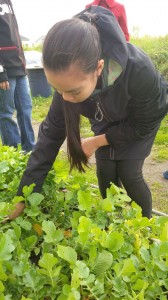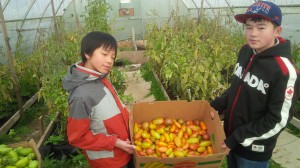 Now that spring has sprung, our adolescent students are resuming their visits to the farm property on Wednesdays. On our first visit this past April 2nd, we had many important tasks to follow up on, as well as new ones to begin! Firstly, we checked on our year-old beehives. Ms. Candice from Mole Hill explained to us what to expect from the bees this spring: they will be leaving the hive more often to explore the surrounding areas, and they will continue building their home.
Now that spring has sprung, our adolescent students are resuming their visits to the farm property on Wednesdays. On our first visit this past April 2nd, we had many important tasks to follow up on, as well as new ones to begin! Firstly, we checked on our year-old beehives. Ms. Candice from Mole Hill explained to us what to expect from the bees this spring: they will be leaving the hive more often to explore the surrounding areas, and they will continue building their home.
Next up was moving the worm compost, as it is growing by the day! Mr. Lyle explained why the new compost bin is set at an angle: the nutrient rich water run off is collected for later use as a fertilizer and pesticide! We also had the pleasure of propagating raspberry bushes by cutting stems from the healthy plants and planting them in an adjacent row. Our students were able to put their muscles to use when they cut into the dirt with a hoe, creating a small trench for the cuttings. Lastly, we picked arugula, carrots, chard, kale and used them to make a delicious salad back at the school! Finally, the students looked at the effect of the fall pruning on the trees. They saw and smelled the first plum flowers foretelling of sweet fruit to come. This is what the farm school program is all about – learning to use the gifts of the land in a way that can benefit the whole community.
Our second visit to the farm required more digging, lifting, and planting! Ms. Sara kindly led the students in uprooting the grass directly surrounding the base of the fruit trees in order to make way for the compost that would support the permaculture. What is permaculture? It is a community of multipurpose plants, which complement and benefit one another, and which make less work for people!
After the compost had been laid at the base of the fruit trees, four carefully chosen seedling species were planted. Students listened and learned about the benefits of planting calendula, chives, clovers, and nasturtium around the apple trees. This rich understory of plants in the orchard will attract beneficial insects, suppress grasses that compete for water and nutrients with the fruit trees, protect from pests, fix nitrogen, provide good ground cover that allows for the conservation of water, and attract bees, among other things.
One thing is for sure: by the time our morning tasks were complete, our students were ready  for lunch! And what a delicious treat they were offered by the monks at Thrangu Monastery. We are very grateful to them for extending their kindness and generosity in offering us a wonderful vegetarian meal.
for lunch! And what a delicious treat they were offered by the monks at Thrangu Monastery. We are very grateful to them for extending their kindness and generosity in offering us a wonderful vegetarian meal.
The students looked on the changes that resulted from their work last year with pride, and moved immediately into taking on the spring tasks. Their joy, discipline and cheerful work together was a clear display of the truth that cultivating the earth, cultivates character. We look forward to our future visits to the farm and bringing back a bounty of fresh fruits and vegetables to share with our community!
© Lions Gate Montessori
